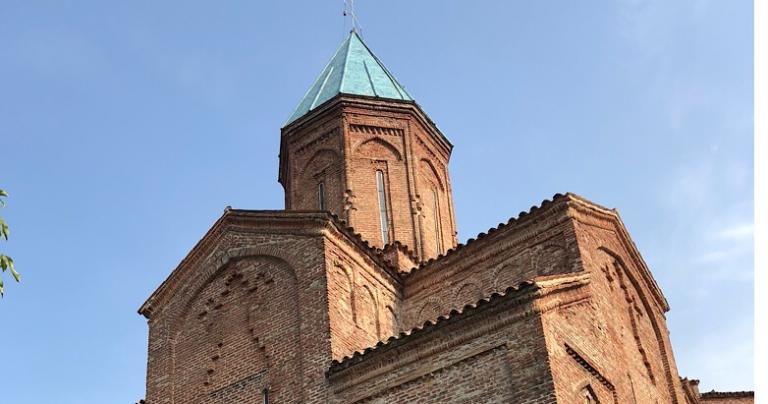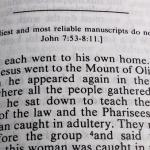
Oedipus knew the truth and gouged out his eyes. I understand this tendency. “Know the truth,” the Greek prophet might have said, “and risk being driven to despair. Are you sure you wish to know?”
Our “should have” is not the same as our “did” and the difference can be devastating.
Jesus offered us something better than a command to know the truth. Instead of truth’s brutal revelation, which must come but is fraught with peril, Jesus asked us to abide in Him and let His living words abide in us. When the truth comes, Jesus will set us free through mercy and grace if we let Him.
Christianity does not retreat from any truth. We do not pretend the cosmos is as it should be or that we are unbroken. We serve a God who says, “Come let us reason” and does not expect us to mindlessly obey. He is also a God who will spend eternity leveling the mountains of our despair and making the roughness of reality smooth.
Our good Father loves us so much He asks for our consent to do this good deed—like a lover, not a tyrant. We can say yes or no and God will let us take the consequences, making the best of them that He can.
One cannot demand the right to consent and then also demand one’s choice have no consequences. This is not obvious to us, caught up as we are with what is happening now, but it is true, nonetheless.
I know you can say no to God because I did. I thought that my shortcomings would seem less if somehow I could deny the truth of the God who said I had failed. All I did was deny any chance for mercy.
The Ideal became the broken.
The Ideal came and let us break Him so that He could go to the very center of the problem and work His way out to save us. That’s lovely. Christianity is a good story, a deep myth, that is also true. Christianity makes sense of the world as it is and helps us see the world as it should be.
When I did not wish Christianity to be true—and I once wished this with all my heart—I was in a secular doctoral program in philosophy. I was well served by excellent professors, most of whom were not theists, let alone Christians. My difficulty was that the harder I thought, the more Christianity seemed true to me.
The arguments against Christianity seemed weak compared to the arguments for the Faith. Christianity was beautiful and so logical. I needed a way to make sense of the world that creates great poetry but also can sustain philosophic discourse and scientific investigation.
There are very few candidates. Christianity is one.
I had no interest in a merely regional religion or one that cut me off from most of humanity. The best candidate for the Truth would appeal to every people group in every part of the world. What could create and sustain a diversity of cultures?
We find splendor and safety in diversity of human experience.
Beauty manifests itself in many ways in the natural world. We see the same in human cultures, though nothing is so beautiful that humanity cannot mess it up. As a result, in our broken state, we cannot trust one expression of the truth. The errors of that expression would undo us all. Cultures, not just one but many, must be created and sustained.
Theism had sustained all the great world cultures, Christian or otherwise. Atheism in power had always led to mass murder: think of revolutionary France, Soviet Russia, or contemporary China. Secularism cannot produce much, and it ruins everything when fully in command.
That much was obvious. So which religion was I to choose?
The candidates were few. Only one had birthed the scientific revolution. Few could sustain scientific cultures. Many had birthed great art and poetry, but few had done so in all the world’s great civilizations. Fewer still had the resources to say no to contemporary impulses.
I knew that any view would have tensions. Knowledge in one area would always appear to contradict some knowledge in another. A harmony might exist, but we are unlikely to see all of it.
Tension, imperfect synthesis of truth, is part of the school for our souls. We learn, slowly, and then we die. At the hour of our death, we see the good, the truth, and beauty perfectly—or so we trust.
And yet none of this was enough to help me choose personally. Christianity as a cultural system had merits, but it was meeting Jesus personally that saved me. I asked Jesus to come into my heart and it made all the difference. My sins are many and my deep regrets continue, but Jesus is a source of beauty and comfort. This helps at the deepest level.
Christianity offers a beauty so piercing, my life is saved.
My family showed me what Jesus could do in the life a person. The Bible, particularly the New Testament, stood as a guide to His nature. My experience could be checked against this splendid collection of books: poetic, historic, mythic, and practical.
Beyond my family, the Church, one, holy, catholic, and orthodox stretches back centuries. There the mistakes and splendors of the past serve as a guide: a family, a Bible, a church, but mostly Jesus.
He is there. To know Him, to see His True Light, is to know truth made bearable by grace. That’s just what I need every day. Immortal Beauty comes and offers me an absolute romance: liberty with virtue.
God helping me, who would not say yes?
Rachel Motte edited this essay.












